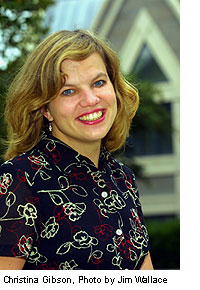
A Career Changed By A Child
A Sanford Institute faculty member takes an innovative approach to welfare reform studies
By Kathy Neal
October 2, 2002 | DURHAM, NC -- Christina Gibson began her academic career in philosophy, but a 5-year-old girl named Autumn helped change her life and her focus.
Gibson, now an assistant professor of public policy studies in Duke's Terry Sanford Institute of Public Policy, majored in philosophy at Bates College in Maine. She then worked at the Hastings Institute, a medical ethics think tank, before applying to the University of Colorado at Boulder's Ph.D. program in philosophy. "I really liked the thinking and mind-stretching," she says of her work at the think tank.
During the summers while still a student, Gibson worked for the Pittsburgh Project, a Christian housing ministry in her hometown. One summer, she met Autumn through a day camp for impoverished children.
"In the morning, her dad would give her $5 to feed herself and then let her roam the streets on the north side of Pittsburgh -- not a safe place for a young child on her own," Gibson says.
Gibson's experience with Autumn and others served by the Pittsburgh Project "had a formative effect on my wanting to do something more hands-on" involving children and poverty, and built on the strong sense of social justice instilled in her by her parents. "My mother was a visiting nurse and my father was a hospital administrator," she says, so social justice "was part of the atmosphere growing up."
After deciding the philosophy program at Boulder was not for her, she researched various graduate programs until she found Northwestern University's program in Human Development and Social Policy. It proved to be an excellent match.
The Northwestern program "provided wonderful opportunities," she says. She credits her adviser, Greg Duncan, a social policy faculty fellow at Northwestern's Institute for Policy Research, with helping shape her academic career, which now focuses on the effects of poverty and anti-poverty programs on children and families. She received her Ph.D. in Human Development and Social Policy from Northwestern in June 2001.
When asked what makes Gibson "tick," Duncan responds, "I'm not sure, but whoever set the ticker set it at double speed. Christina was a delightful graduate student -- eager to take a wide variety of courses, take on both qualitative and quantitative research projects and work hard to understand the policy implications of her research. We miss her, but are delighted that she landed a job at such a prestigious policy school."
After Northwestern, Gibson pursued a post-doctoral fellowship at Princeton's Center on Child Wellbeing, then began work at Duke in July. She considered other universities, but the South "was the only major area of the country I hadn't lived in." Another strong selling point for Duke was "the energy and excitement" she sensed at the institute's Center for Child and Family Policy, as well as the institute's strong multidisciplinary approach to child and family issues.
And Duke is delighted to have her. "Christina is addressing one of the most important problems in society today, how poverty affects children's development," says Ken Dodge, director of the Center for Child and Family Policy and William McDougall Professor of Public Policy Studies. "She represents an enormously important appointment for our department because she brings a rigorous, scientific perspective to bear on the policy problem of welfare. Her research is a model for the field, and she is moving the Center for Child and Family Policy squarely into the middle of national discourse about welfare reform."
When choosing Duke, Gibson also appreciated its emphasis on balancing work and other activities. She was impressed during her interview with Dean of Humanities and Social Sciences Karla Holloway when Holloway told her, "We want you to have a life here," not just a career.
So despite the rigors of being a junior faculty member, Gibson strives to follow Holloway's advice. She runs, plays tennis and, as institute colleagues can attest, plays a spirited game of volleyball.
She brings the same vigor to her work. "I have two ultimate goals: As a teacher, I want to help make students, especially undergraduates, aware of life circumstances, to broaden their horizons. As a researcher, I want to be relevant -- to attract the attention of policymakers, especially in D.C."
Dodge has no doubt she will achieve her goals. "We are fortunate to attract to Duke one of the nation's leading young scholars in welfare reform," he says. "Christina's impact will range from the science of child development to the halls of Congress."
|





